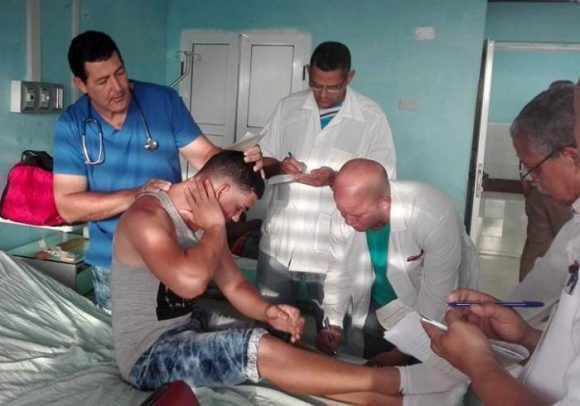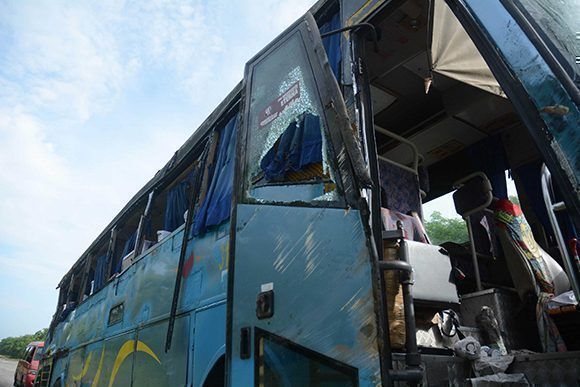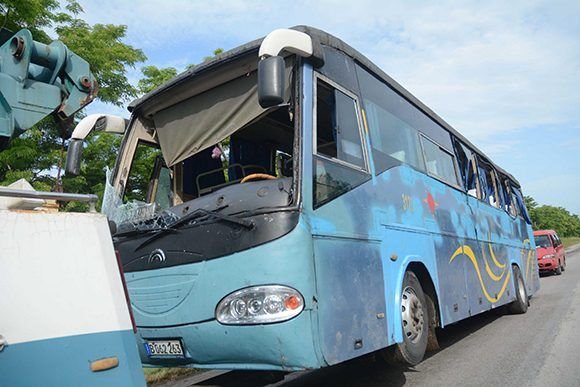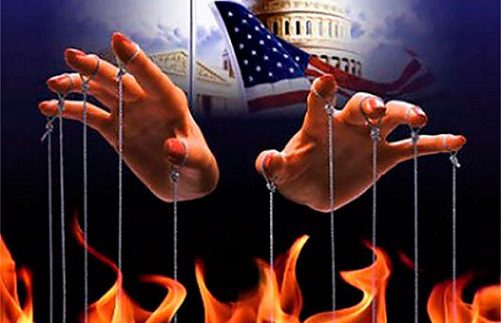Translations 677
Mass traffic accident in Sancti Spíritus

Mass traffic accident in Sancti Spíritus, 30 injured reported (+ Photos and Video)
By Israel Hernández Álvarez
July 28, 2018.
Translated and edited by Walter Lippmann for CubaNews.

View of the state of the Yutong bus after the traffic accident that occurred at dawn on July 28, 2018 at kilometer 327 of the National Highway, near Cabaiguán, in the Sancti Spíritus province, when the bus went off the road and when trying to get up it overturned. Photo: Oscar Alfonso Sosa/ ACN.
One person was reported seriously injured among the 30 injured in the traffic accident that occurred at dawn this Saturday at kilometer 327 of the National Highway, belonging to the province of Sancti Spíritus.
The incident occurred when a Yutong bus went off the road and its driver, trying to incorporate it into the road, lost control of the vehicle, which overturned.
The general hospital Camilo Cienfuegos received the injured, some of whom received first aid at the mother and child hospital in the municipality of Cabaiguán.
Two children are in a state of care and are cared for at the José Martí Provincial Pediatric Hospital.
At noon today, 22 people with minor injuries had already been discharged from the hospital and, after receiving the appropriate treatment and verifying their good state of health, they continued their journey to Havana, the destination of the National Bus Company’s vehicle, which was arriving by freight from Baracoa, in the province of Guantánamo.
Dr. Eduardo Pedrosa Prado, director of the Camilo Cienfuegos Hospital, told ACN that, as in these cases, the Integrated Emergency Medical System was immediately activated and the injured were provided with the necessary resources for their care.
Every four hours, Pedrosa Prado added, we make the visit pass, and in correspondence with the evolution of the patients we will adopt the behavior to follow with them.
Upon learning of the incident, authorities of the Cuban Communist Party, the Government and the Health Ministry in the territory went to the largest health centre in Sancti Spíritus to take an interest in the wounded and their medical care.
This is the fifth massive accident that has taken place this year in the territory of the Spirit, and the second in less than 10 days; the previous one took place in the early hours of last Saturday at kilometer 332, also on the National Highway, in which 37 people were injured.

Injured patients receive care at the Camilo Cienfuegos Provincial Hospital. Photo: Cristóbal Álamo/ Escambray.

View of the right side of the Yutong bus state, involved in the traffic accident that occurred at dawn on July 28, 2018 at kilometer 327 of the National Highway, near Cabaiguán, in Sancti Spíritus province, when the bus went off the road and when trying to get on board it capsized. Photo: Oscar Alfonso Sosa/ ACN.

The injured were immediately taken to the Camilo Cienfuegos General Hospital in Sancti Spíritus, where they were treated on July 28, 2018. Photo: Oscar Alfonso Sosa/ ACN.

View of the state of the Yutong bus after the traffic accident that occurred at dawn on July 28, 2018 at kilometer 327 of the National Highway, near Cabaiguán, in the Sancti Spíritus province, when the bus went off the road and when trying to get up it overturned. Photo: Oscar Alfonso Sosa/ ACN.
Curiosities About the Sexual Act

Curiosities About the Sexual Act Around the World
Sexual intercourse is possibly the oldest and most universal practice in the world, but the way in which each person does it differs considerably from country to country.
By Juventud Rebelde digital@juventudrebelde.cu
Published: 03/08/2018 | 05:15 pm
A CubaNews translation.
Edited by Walter Lippmann.

Love eros is an idealized form of love, it is the passionate feeling of ecstasy experienced at the beginning of a new relationship, where passion and physical attraction are the driving forces, tends not to last in the long run. Author: Juventud Rebelde.
After research by the BBC Crossing Continents programme, she discovered fascinating facts about culture and sex.
When it comes to having sex, there’s a little bit of everything: from people who practice celibacy to those who dance with apples in their armpits as part of sexual conquest.
Some of the most striking customs are:
1. Proper names for the genitals
The ancient Hawaiians used to give their genitals affectionate names. But not only that, both royalty and commoners had their own mele ma’i, a personalized genital song.
These lyrical odes would describe the lower regions of the individual in some detail and quite broadly.
An expert on Hawaiian sexual behavior, Dr. Milton Diamond, tells how Queen Lili’uokulani’s song speaks of her genitals “frolicking, going up and down”.
2. Towards celibacy
The birth rate in Japan is declining, as are contraceptive methods such as condoms and the pill. Abortions and sexually transmitted diseases have also declined.
“The only explanation is that the Japanese are having less sex,” says Kunio Kitamura, head of Japan’s family planning association.
Recent research has shown that there are a record number of couples living in marriage without sex and that one-third of men say they are too tired to have sex.
The report notes that a quarter of women consider sex to be problematic.
Another survey, which examined people between the ages of 18 and 34, found that the proportion of virgin people had skyrocketed over the past decade: almost 45% said they had never had sex.
3. A day marked for conception
In Russia, meanwhile, the birth rate is advocated to increase, so one region of the country has introduced an ingenious way of getting the population to procreate.
The governor of Ulyanovsk, just east of Moscow, declared September 12 as Conception Day: a holiday that encourages couples to stay at home for the sole purpose of producing offspring.
Couples who have a baby nine months later receive prizes such as video cameras, refrigerators and washing machines.
4. The fish of conquest
In the small town of Mehinaku, in central Brazil, women have devised a simple way to decide between their suitors. There, the men who compete for a woman’s affection have to bring her a fish as a gift and the one who gets the biggest piece takes the girl.
5. Apples with fragrance
In rural Austria, it was traditional for women to attend a dance with apple slices under their armpits, after inspecting the men in the room, to offer the chosen one a piece of the sweaty apple.
If the feelings were reciprocal and the man also liked her, he would take a bite out of the apple…. which would certainly have a “special” essence.
6. Falling to the ground
This is a community where being clumsy on the dance floor can really help you in your conquest. The men and women of a Colombian Guajira tribe participate in a special ceremonial dance, in which if a woman causes a man to stumble during the dance, then both must have sex.
This practice gives a new meaning to the phrase “fall asleep”.
7. Holidays…. “active”
According to research by the travel company Spies Travel, Danes have 46% more sex on holiday, not to mention that 10% of Danish babies are conceived during their parents’ holidays.
As a reward for such activity on holiday days, in 2014 the travel agency offered three years of baby supplies and a child-friendly holiday to any of its customers who could prove that they had conceived during their holiday.
8. Those who practice most
According to a global survey conducted by condom manufacturer Durex, which included nearly 30,000 people over the age of 16 in 26 different countries, Greece is the place to be.
Conspiracy Against Venezuela

The Actors in the Conspiracy Against Venezuela
By Eduardo Andrade Bone*, Resumen Latin Americano Summary, August 7, 2018.
Translated and edited by Walter Lippmann for CubaNews.
https://walterlippmann.com/conspiracy-against-venezuela/
The recent assassination attempt against Nicolás Maduro, whose drone operation was neutralized by members of the Bolivarian National Armed Force, is part of a long-standing plan to end the process of change in Venezuela, known as the Bolivarian Revolution. But it was also an attempt to warn the armed forces, with the aim of dividing them and adding a sector to promote a coup d’état.
Now the U.S. offensive to end the Maduro administration dates back to the administration of Barack Obama, who issued the executive order (decree 2015) declaring Venezuela an “unusual and extraordinary threat to U.S. national security and foreign policy. Subsequently, US President Donald Trump ordered a one-year extension of the “National Emergency” against Venezuela. This has also taken the form of economic sanctions, sanctions against government officials and the armed forces. The US government has also promoted the blockade of food products and various medicines, all within the destabilising plans of the White House.
Attempts to destabilize the Venezuelan government have many sides and also many actors who, directly or from the shadows, constantly conspire against Venezuelan democracy. Venezuelan U.S. lackeys, foreign plotters, U.S.-funded NGOs, organizations of diverse professionals, the national plutocracy and the most reactionary and conservative section of the Catholic Church are often the main plotters in the Caribbean country.
Among these various actors, who play a leading role in putting an end to the Bolivarian revolution, is the Organization of American States, whose Secretary General Luis Almagro is a good vassal of U.S. interests for the region and one of the leaders leading the conspiracy, as well as coordinating actions with the European Union and some NATO member countries (Colombia).
The new Colombian president, Iván Duque, also insisted that the region should support the secretary of the Organization of American States (OAS), Luis Almagro, in his efforts to continue to plot against the Maduro government before the International Criminal Court (ICC). Duque met with Almagro last July 1, during his visit to the United States after his election.
We also have the so-called Lima Group, made up of right-wing governments whose presidents are mostly members of the ranks of the presidents linked to corruption (Odebrecht+-), among them the Macri family (Argentina), bank swindler Sebastián Piñera (Chile), Juan Manuel Santos (Colombia) and Peña Nieto (Mexico), who have almost completed their terms. The corrupt and de facto president of Brazil, Michel Temer. In addition to countries traditionally servile to U.S. policies such as Costa Rica, Guatemala, Honduras, Panama, Paraguay and Peru, also with leaders questioned for corruption.
Recently and before the end of his term in office, Juan Manuel Santos told the press that… “I see the fall of the government of Nicolás Maduro in Venezuela coming,” said the outgoing president of Colombia, and then added that Maduro would fall, hopefully in a “peaceful way”. However, Santos insisted, “I wish that tomorrow” Maduro’s government would end, exposing him as one of the main plotters against Venezuela.
Now the successor of Juan Manuel Santos (Colombia), the already president of Colombia, Uribe’s Ivan Duque, agreed in his visit as president-elect with the White House with U.S. Vice President Mike Pence (July 5, 2018), to continue pressuring the Venezuelan government. “We talked about the situation in Colombia, about our security agenda, we also talked about the situation being experienced in the continent by the dictatorship in Venezuela,” Duque told the press.
For his part, Pence told a Tweet that he had spoken to Duque about the bilateral “strategic alliance“”in the fight against drug trafficking” and that they had “reiterated the need to maintain pressure on the regime of (Venezuelan President Nicolás) Maduro to face the tragic collapse of democracy in Venezuela”.
Duque gave Pence a glimpse of a possible military route in Venezuela after the White House confirmed to the Efe agency that U.S. President Donald Trump asked his team last year about an invasion of the Caribbean country and, although he never really planned for it, that option has not been ruled out.
But that wasn’t all, as Duque concluded his trip to Washington where he met with other U.S. officials including Secretary of State Mike Pompeo, CIA Director Gina Haspel and National Security Advisor John Bolton. Also with the Secretary General of the OAS, Luis Almagro, and the directors of the World Bank, all this happened on July 5 of this year.
He later stated that he had invited Pence to his inauguration on 7 August and hoped that “the US would have the highest possible representation”. Now, in the act of assassination of Duque, he has been considering a coordination meeting with Mike Pence and Luis Almagro, as well as with some representatives of the opposition to the Maduro government, with the aim of refining and coordinating the way in which they are trying to put an end to Nicolás Maduro and his government, whose final objective is none other than to appropriate Venezuela’s natural resources, especially one of the largest oil reserves in the world, which the Caribbean country has.
Hence, all the cards are already out on the table and they are none other than the economic suffocation, the assassination attempt as has happened during these days, the possibility of creating conditions for a coup d’état by dividing the armed forces, promoting terrorist actions that disconcert the population, unleashing a civil war or producing a direct military intervention, whose cannon fodder first is the paramilitaries and drug trafficking cartels of Colombia, and then continuing with the U.S. military personnel who are based in the eight military bases that the United States has in Colombia.
It is also worth noting that the Empire has an important ally for its destabilizing attempts, the various radical left-wing groups that do not support and do not contribute anything to the process of change and that from certain media through the Internet, are dedicated to ranting against the Bolivarian revolution by playing into the hands of the coup plotters, a factor that must also be taken into account when analyzing Venezuela’s domestic policy.
Hence, the story of the humanitarian crisis, the human rights problems and the character of dictatorship are elements that are exploited by the Western media with the aim of creating all the propitious conditions to facilitate and justify the destabilization of the government of Nicolás Maduro and the process of change in Venezuela.
For the Venezuelan oligarchy, the big businessmen and the geopolitical interests of the U.S. in the region, anything goes, including plunging Venezuela into a bloodbath, where the big losers will be the working class, the social sectors that support the process of change, the members of the armed forces that support the Bolivarian revolution and the loss of control over its natural resources, as simple as that.
Eduardo Andrade Bone is an AIP/MP press correspondent.
New Face of Palestinian Resistance

Ahed Tamimi, the new face of Palestinian Resistance
The 16-year-old girl arrested by the Israeli army two weeks ago has become a symbol of Palestinian resistance.
Author: Ernesto J. Gómez Figueredo | internet@granma.cu
January 5, 2018 01:01:52
A CubaNews translation.
Edited by Walter Lippmann.

The international campaign for the liberation of Tamimi, the new flag against imperialist policy in the Middle East. Photo: PalestineFree Photo: Palestinalibre
With curly, thin, brave hair, that’s the image of Ahed Tamimi, the 16-year-old girl arrested by the Israeli army two weeks ago who has become a symbol of Palestinian resistance.
An Israeli military court charged the teenager with 12 crimes after the incident in which she slapped a Zionist army soldier after he entered her backyard.
Thanks to his family’s filming of the events, images of his resistance went around the world.
Tamimi is one of many minors arrested by the Zionist army for the purpose of being “interrogated” about alleged illegal activities. Army spokesmen confirmed that Ahed is charged with “assaulting a soldier”.
“She argued with the Zionist Defense Forces because her cousin Mohammad, 15, had been shot,” her father said. The Israeli version is that they were “throwing stones”.
According to the Committee for Palestinian Prisoners’ Affairs, the number of Palestinians detained by Israeli security forces since US President Donald Trump declared Jerusalem the capital of Israel on 6 December has risen to 610, including 170 minors.
The young woman lives in Nabi Saleh, 20 kilometers from Ramallah in the occupied West Bank. He claims he wants them to see them as fighters, not victims. “Ahed says she does what any Palestinian child does, but she is filmed,” her father said in an article in the Haaretz newspaper.
“I do not want to be identified as a victim, and I will not give your actions the power to define who I am and will be. I choose to decide for myself how you will see me. We don’t want your support because of photogenic tears, but because we choose the fight and the fight is fair. This is going to be the only way we will ever stop crying,” wrote the father, reproducing Ahed’s words.
Tamimi is already an international heroine of the Palestinian cause and after her arrest her mother and cousin were also arrested.
The arrest of the Tamimi family was like the fire that awaited the sleeping powder of the international community to react. For days now, social networks have been flooded with messages calling for the release of mother, daughter and cousin, under the labels #FreeAhedTamimi and #LibertadAhedTamimi.
Palestinian President Mahmoud Abbas called Ahed’s father, Basem Tamimi, a Fatah militant, and praised the family for “the key role” in the protests in his people against the Israeli occupation and settlements, according to an official statement.
“I can’t think about the future because the Israeli occupation prevents me from thinking about it. When I went to play in the streets, the army would come in and start shooting,” she said.
The international campaign for the liberation of Ahed Tamimi is a new flag against imperialist policy in the Middle East and highlights the crimes committed by the Zionist regime.
Ahed Tamimi, Rebel With a Cause

LEADING FIGURES
Ahed Tamimi, Rebel With a Cause
With her, Palestine found what the media had long ago not allowed to be seen in those parts of the world: rebellion, beyond resistance.
———————————————————————————————–
Author: Darcy Borrero Batista | darcy@granma.cu
August 7, 2018 17:08:03
A CubaNews translation.
Edited by Walter Lippmann.

The Palestinian teenager arrives at a press conference with her mother Nariman (right) in her hometown. Photo: El Clarin
She entered the Israeli prison of Hasharon at the age of 16, with abundant curly hair, uncovered, and rebellion scattered among her belongings. Eight months passed from that day until the last Sunday in July, when Palestinian Ahed Tamimi, now 17, regained her freedom from the Israeli occupiers.
With it, Palestine found what the media had long ago not allowed to be seen in those parts of the world: rebellion, beyond resistance.
The teenager did not stand idly by in the face of the abuse of her family. The video, in which she is frankly dissatisfied with the Israeli violence against her brothers, was shown as a trophy of war, as if responding to the violence were, in this case, a peaceful exercise and not an act of rebellion.
Because of the way they act, it is not possible to speak of the symbolic as something common. In a thinner and thinner strip, Tamimi gets up the way flags do and while some want to make it look like they’re touching the ground, the airs of real struggle make them rise to the top of the flagpole.
Her adolescent face then emerges as a challenge to the status quo, even if the Israeli regime seeks to grab the pole with no other limit than to lower the Palestinian flag and keep the territory on the other side of the line.
Moving the U.S. embassy to Jerusalem, the capital of Israel – a state conceived for the Hebrew vindication after the racist anti-Semitic war unfolded by fascism – sets in motion the conflict in which Tamimi emerges as the voice of an urgent humanitarian cause: the cessation of extortion against the Palestinians, who are increasingly losing their land, their freedom and even their right to a dignified life.
Since she was imprisoned, Tamimi’s videos – the last of them slapping and kicking an occupying soldier in her village, the occupied West Bank, and the first threatening to punch a soldier after her older brother was arrested – have been manipulated in many ways. There are those who call them “Pallywood” in a mocking tone and say that the teenager is exploited by her family, who are accused of using her to try to provoke the Israeli soldiers.
The difference between the two videos is several years. The most recent was recorded on December 15 and the oldest when Tamimi was 11 years old.

Three out of four Palestinians detained by Israel are youth or adolescents. PHOTO: palestinalibre.org.
Tamimi seems to have plenty of hope despite all that she experienced at her young age. In a certain way, she reflected this when she said: “power is in the people and the people are the masters of their destiny and their future”. Her followers responded with applause.
The young woman also showed her solidarity with the Bedouin people of Khan al-Ahmar, who are awaiting demolition by Israel, and refused to answer questions from the Israeli media. Instead, she expressed appreciation for the media support received during the months of her imprisonment and hoped that the campaign for her release would be extended to the rest of the Palestinian adolescents who remain in Israeli jails.
Remember that this girl was arrested in December and sentenced on March 21, after accepting a suffocating agreement with the Office of the Prosecutor and assuming the charges of aggravated incitement and aggression, among others. Thus they condemned the rebellion with Tamimi’s cause. It would be necessary to see in which court it is condemned to the Israeli soldiers, the “defenseless” ones that take to jail to these adolescents, only to give them a slaps full of dignity and love to theirs.
IN CONTEXT:
– The Government of Israel applies the age of criminal responsibility for Palestinians to 12 years. In addition, children can be imprisoned for up to five years for just throwing stones.
– Every year, between 500 and 700 Palestinian children in the West Bank are arrested and interrogated by Israeli forces before being tried in military courts. Most of them are accused of throwing stones.
– Since 2000, some 7,500 Palestinian children aged 12 and over have been detained and tried by this judicial system.
– According to a report by Defense for Children International, a total of 210 children and one girl are currently in prison in Israel, 34 of them under the age of 16.
– Nearly two-thirds of Palestinian children and minors detained by the Israeli regime in 2017 were abused by their captors, according to a report by the Palestinian non-governmental organization Military Court Watch.
– International law prohibits the use of the death penalty for crimes committed by persons under 18 years of age.
Venezuela Has Been Strengthened
The Bolivarian Revolution Has Been Strengthened

By Manuel E. Yepe
http://manuelyepe.wordpress.com/
Exclusive for the daily POR ESTO! of Merida, Mexico.
Translated and edited by Walter Lippmann.
The frustrated assassination attempt against President Nicolás Maduro Moros on August 4 in Caracas will decisively strengthen the Bolivarian revolution in Venezuela and make it invincible.
It would seem that such a crime was all that was left for the Venezuelan counterrevolution to completely lose the credibility it has enjoyed among the few sectors of the population that have been supporting it. They are interested in recovering the privileges they enjoyed before the Chávez revolution. They also want to win over those who had been won over by the siren songs of Washington, whose endless capitalist propaganda about the possibility of maintaining the social benefits recently achieved by the revolution in a more just, but still unequal, society in which they could already be part of a less poor class.
It is evident that the once-opulent Venezuelan oligarchy – pulling strings from the current violent opposition – in alliance with the mafia, both subordinated to the U.S. strategy and limperialist command, carried out this action. Their objective was of turning history around, regaining control of Venezuela’s oil wealth, and once again returning the homeland of Bolivar and Chavez to the status of a U.S. puppet.
Only problem was that Venezuelan revolutionaries and patriots think very differently. The previously-dispossessed classes, along with advances in their material well-being, have seen their political culture and social consciousness grow. They are and are less polluting and less seduceable by imaginings of material progress. The humble are also the most conscious as members and allies of the working classes in the revolution.
The measures recently announced by Nicolás Maduro, in relation to fuel control, and his new approaches to the country’s economy, have taken a heavy toll on the enemies of the Bolivarian process. It was this which, according to all indications, led them to take action on August 4th. Their foolish calculation was that the elimination of Maduro would put an end to a process whose roots are, in fact, much deeper.
At the time of the failed criminal attack, the President was at a meeting in Caracas, commemorating the 81st anniversary of the Bolivarian National Guard. In the middle of his speech, two strong explosions were heard. “Madurop called for an honest and hard-working Venezuela: let’s bet on the good of our country. The time has come for economic recovery.” Maduro said this at the moment when, according to later unofficial information, a drone with a C4 plastic explosive charge exploded near the presidential box.
The President, his wife Cilia Flores, and members of the Cabinet were not injured. They were quickly moved to safety, according to official information. This act of terrorism sought to overthrow a government that is the result of the democratic will of the Venezuelan people. This people’s support for the Chavista revolution has been reaffirmed on many occasions at the ballot box. It constituted a desperate attempt to achieve, by means of assassination, what they have not been able to obtain in several elections.
Nor have they achieved it through coups d’etat like the one of 2002 against the then President Hugo Chávez. Same with the oil coup of 2003 and the extensive and intense imperialist policy of harassment to overthrow the Bolivarian Revolution. This includes the arbitrary and aggressive US Executive Order describing Venezuela as “an unusual and extraordinary threat to national security and foreign policy” of the superpower. They have unilaterally imposed economic sanctions violating international law. The US Secretary of State declared the full validity of the Monroe Doctrine, He called for a military coup against the constitutional government of Venezuela. Trump warned against “a possible military option” against Venezuela.
The aggression and the coup against Venezuela hurt all of Latin America. It benefitted only the interests of those who are determined to divide the countries and peoples of the region so they can exercise their domination over our nations.
These people support the empire of the North in their maneuvers are using unconstitutional means to overthrow the Bolivarian and Chavista revolution. They don’t care if this generates conflicts of incalculable consequences for this region. Sooner or later they will have to assume a serious responsibility before history and answer for this before their peoples.
Nobody doubts that the failed attempt of assassination in Caracas is a powerful further reason for Latin American and Caribbean unity against imperialist domination!
August 6 of 2018.
NATO is a Gold Mine for the Arms Industry
NATO is a Gold Mine for the Arms Industry

By Manuel E. Yepe
http://manuelyepe.wordpress.com/
Exclusive for the daily POR ESTO! of Merida, Mexico.
Translated and edited by Walter Lippmann.
President Trump has ordered the NATO countries to increase their arms spending. The reasons for his insistence on doing so are becoming increasingly clear. It has nothing to do with any defense logic. After all, the Secretary-General of the US-NATO military alliance, Jens Stoltenberg, has admitted that “we do not see any imminent threat against a NATO ally”. Also, the Stockholm International Peace Research Institute recorded in its 2018 World Report that “at $66.3 billion, Russia’s military spending in 2017 was 20% lower than in 2016”.
Radio Free Europe, the US government’s anti-Russian station, reports repeatedly that Russia has reduced its defense spending.
It has been proven that Russia poses no threat to any NATO country. But even this is considered irrelevant in the context that US arms sales are flourishing and those who carry it out are being encouraged to increase and multiply their business.
On July 12, the second and final day of the recent meeting between the United States and NATO, the British news agency Reuters issued a categorical statement with a clear promotional orientation from Trump: “The United States produces by far the best military equipment in the world: the best planes, the best missiles, the best weapons, the best of all.”
The president then listed by name the major U.S. arms manufacturers: Lockheed Martin, Boeing, and Northrop Grumman.
Trump proudly stated at the NATO conference that the United States has many rich countries as customers, “but we also have some not-so-rich countries and they ask me if they can buy US military equipment and if we can help them, and we tell them that we will help them a little. He added that “poorer countries that want to buy U.S. arms may not have to put cash into their purchases.
That single statement raised the prices of the shares of the three arms manufacturers named by Donald Trump and referred to in the previous paragraph by more than ten dollars.
The State Department, to boost the bonanza, made every effort to facilitate further U.S. arms sales by allowing arms manufacturers to bypass their checks and balances. These had been established to hamper the purchase of weapons from the United States by regimes considered to be of ill-repute in the world who want to buy weapons from the United States to put a fig leaf over some if some of its legal, moral and economic restrictions.
In fact, these regulations no longer apply. On July 13, the State Department announced new measures to “accelerate government approval of proposals from aerospace and defense companies,
Within European NATO, the biggest buyers of US arms are Poland, Romania, Great Britain and Greece, and the quantities involved are colossal.
The message to European NATO is that the US is making every effort to sell weapons and wants to make them see that there is scope to buy more of the “best jets, the best missiles, the best weapons” that Trump has to offer.
As journalist Brian Cloughley defined it on July 30th on the Counterpunch and Strategic-Culture websites, “NATO’s gold mine is there to be exploited and, following Trump’s enthusiastic encouragement of the manufacturers of its weapons, it looks like the extraction will be effective. The U.S. Military Industrial Complex will benefit greatly from its President’s campaign to increase the number of weapons in the world.
Lieutenant General Charles Hooper, Director of the US Defense Security Cooperation Agency, told the Farnborough International Air Show on July 18 that “defense exports are good for our national security, good for our foreign policy… and good for our economic security. He then proposed that his agency reduce the transportation fees charged to foreign military customers, which would be an important stimulus to the sales of “the best jets, the best missiles, the best weapons” so highly valued by Mr. Trump.
This officer, obviously a devoted follower of his President, followed his line of action with dedication, reminding the media that as they have said “administration and our leadership, economic security is national security.”
August 2, 2018.
A cool socialism (III)

A cool socialism (III)
Author: Félix López
A CubaNews translation.
Edited by Walter Lippmann.
We come today to young Alejandro’s third and most complicated paradox: “If not socialism, what do we have left?” It would seem our young man was looking for an exit on the expressway, but I don’t think so since he already made it clear he goes for a cool socialism. Well? Nothing, I can see he wants and needs to know what the non-socialist option has in store for us. And I will answer him without using the worn-out tale of the Big Bad Capitalistic Wolf devouring the Proletarian Little Red Riding Hood.
What’s at stake is a lot more than a remake of a children’s story: history, maybe life itself; our ecology and future; our happiness and existence. Socialism is all that and even more: the sworn enemy of selfishness and inequality, boundless consumption and violence, warmongering and expansionism, drugs and pornography, a lifestyle based on foolishness and glamour… all synonymous with capitalism, designer of a society where –contrary to Martí’s precepts– the more you have to show off, the more valuable you are; where it’s not how you think but how well you’re dressed and what brand your cell phone is what matters; where people’s worth is measured by their fortune –ergo, the have-nots are not people– and the ID cards have been replaced with credit cards; where a mall is more worshipped than a university; where, according to Eduardo Galeano, to praise a flower you say, “it’s so beautiful you’d think it’s plastic!”
If not socialism, Alejandro, barbarism would be the only option left to us. I’m sure that capitalism would waste no time in presenting us with an oasis of spotless showcases and the mythical junk food franchises would compete for the best spots downtown where they could create a mirage of lights and affluence, as they did in the former USSR… and all the while that artificial bubble would be surrounded in a flash by a poor area with no schools but teeming with gangs; with no jobs but many prostitutes; with nothing to dream about but lots of drugs to forget that fact; with no quality lifestyle but the required TV set to sell you all kinds of comforts… and you bet I’m not even mentioning the terrible dangers fueled by deep-seated hatred.
There’s another, simpler and more realistic answer to Alejandro’s question: you either make sure you become an enterprising optimist and strive to build a cooler socialism –so you can keep your freedom and at the same time have a better and happier life– or risk your neck at the Russian roulette in a casino and end up finding out that in the realm of “every man for himself” even your smile can be mortgaged. It’s no coincidence that Silvio Rodríguez, who has traveled around the world and gives us through his music a kaleidoscope of life, voiced his support of a perfectible socialism in his capacity of Deputy to our National Assembly of the People’s Power, making it clear that we can improve ours and we must do it by ourselves.
President Raúl Castro warned in a recent speech that he had not been elected to restore capitalism in Cuba and invited all Cubans to discuss what kind of socialism we want. If we ever lose the gift of participation the Revolution will have lost its sense of direction. Hence the importance that we, our parents and our children, that is, three or more generations of Cubans –in one of which Alejandro belongs– take part in this get-together and engage in a collective reflection free of slogans and mechanistic attitudes.
I feel certain that our socialist values will come out stronger as a result. Not long ago, on the occasion of the Cuban Revolution’s 50th birthday, a number of young intellectuals were invited to talk about it and the realization of the socialist project. What follows is just a thumbnail sample of their comments sufficient to understand how necessary and comprehensive is the debate awaiting us:
Julio César Guanche: “In 1959, the Cuban Revolution gave birth to a beautiful specimen of utopian socialism and implemented on Cuban soil a significant part of Rousseau’s great ideal: universal citizenship, a sovereign society, and social justice. Fifty years later, Cuba realized that a revolution is not the ultimate goal, as every thing conquered must be re-conquered and changing with the times is the only way to move on”.
Ariel Dacal: “We must publicly discuss how we understand socialism and what to do to make it more effective in its quest for an anti-capitalist alternative, which entails as much social justice as possible. People’s education, culture, technical ability, feelings and political knowledge are underrated and in some cases wasted. In order to reverse that situation we must make qualitative changes in the way people get involved in the management and control of their daily individual and public life, both as workers and community members”.
José A. Fernández: “Our Socialism has fought against poverty, capitalism, imperialism and its worst manners –war and terrorism– as well as against the immobility of state bureaucracy, political ignorance, the opportunism of the alleged extremists, the tiny internal opposition and the strong external opposition, the ghost of the ‘siege’ that prevents us from trusting our own potential to be freer… We have contributed the beauty of a whole people of women and men forged with blood and fire, blockade and militia, lack of resources and a wealth of wisdom and faith in the justice we have earned”.
I hope that both young Alejandro and those who read these comments found in them food for thought, issues to debate, new questions and some answers. Many people deem a discussion about socialism in present and future tense a thorny subject. Rest assured that if we do it in public, using a pro-positive key instead of drawing up an inventory of problems, we will no longer be treading on waste land. The forest is crawling with snipers.
We have to keep creating and learning if we want to make progress and be better. With the energy of our people and Fidel’s endless supply of creative thoughts we have done what once seemed impossible: we saved socialism.
A cool socialism (II)

A cool socialism (II)
Author: Félix López
A CubaNews translation.
Edited by Walter Lippmann.
Why does socialism seem more concerned about ideology than about aesthetics?, young Alexander asked, his question undoubtedly originating with his concept of a cool socialism: a just, nice society, estranged from capitalism’s “every-man-for-himself” laws and free from any ugliness, sloppiness, vulgarity, mediocrity, bad taste and boredom for good measure. To young people, “being cool” means hip, fashionable and graceful, the kind of synonym Alejandro chooses for his life.
Let’s come to the grips with his poser. The praxis, to be sure, ended up leaning to the ideological side, but I think the idea of favoring ideology over aesthetics never entered the mind of the socialist theoreticians or the letter of the classics. Lenin, for one, warned us that disseminating ugliness and annoyance was by no means good revolutionary communication. A case in point is Cuba, where plays, movies, books and museum exhibitions became real crowd-pullers following the democratization of culture and seeing a worker enjoying a classical ballet or a scientist shaking her hips like one possessed to the rhythm of a popular band is no longer surprising.
Cuban culture is the perfect example that most people want socialism free of any gaudiness. Many of us brag about the criollo, Martí-oriented and Caribbean nature of our Revolution without overlooking the benefits and influence –both positive and negative– of the Krim TV sets, the Moskvich cars, the Hanka and Danka cartoons, the incomprehensible jokes of Ferdinand the Clown, and the “proletarian chivalry” clichés. Or the avalanche of luggage bursting at the seams with bad taste that our relatives in Miami are bringing here as we speak. Or the blue jeans with golden dragons embroidered on the pockets that a Cuban state purchaser –a très unchic one, by the way– brings from overseas to supply our department stores.
Alejandro, make no mistake: Marx and Lenin dreamed about one thing, but the final outcome after the [mis]interpretations was another matter altogether. Let me give you one example: in the months following the triumph of the Russian revolution, the avant-garde currents were deemed a natural complement to revolutionary policy. Constructivism flourished in the visual arts, while poetry and music praised all non-traditional and modernist forms… until one day that the illustrated bureaucrats let their criticism run free, saying that impressionism, surrealism, Dadaism, cubism and other modern styles were full of subjectivist principles –which crashed head-on with dialectical materialism’s objective aspirations– and ruled it was “bourgeois art”.
That’s how the curtains of cultural diversity were drawn and socialist realism came on stage, aesthetic flaws and all, convinced that only the topics touching on politics and the working class were worth the effort. Then the USSR exported it most other socialist states, where the doctrine took on various degrees of significance… only to see its eagerness to describe people’s simple life –with Maksim Gorky’s work as one major exponent– become swamped in a dogmatic and exclusionist vision of socialism that eventually harmed the mission of its culture.
It’s a commonly held, albeit wrong, belief –often used as a justification– that a poor, underdeveloped country can’t afford to think about aesthetics when it has so many other fish to fry, namely to feed, shelter and clothe its population. A comfortable economic and financial situation makes everything easier, I have to give you that, but at the same time I flatly refuse to second such ode to misfortune. My grandma used to say something became a canon at home: “Poor but honorable; patched but clean”. Our greatness lies in surmounting that crest of hardship and being different.
In my previous comment I asked: “How much longer do we have to wait until our builders, food service workers and everyone else in charge of making people’s life happy rather than miserable become steeped in the excellence we have achieved in research, sports and culture?” Well, here’s another question: how did we manage to remain immune from the unsightly contamination of socialist realism and even oppose it with a recognized movement of graphic designers, filmmakers with a soul of their own and protest singers who leaped over the bureaucratic censors and became a poetic monument to Cuban culture?
Luckily, we don’t have to go out in search of the answer. Cuba has every reason to take pride in its indigenous culture, its own creations, and its people’s commitment to the Revolution and boldness to conquer the bureaucrats’ Golgotha and inherent ability to come up with a problem for every solution. Dialectics, participation, authenticity and our criollo cleverness… those are the best antidote to sloppiness, banality and laziness. Aren’t the New Song Movement’s lyrics cool or what? Who says Cuban baseball or the way [110-meter hurdles racer] Dayron Robles runs are not cool? How to deny that the children of La Colmenita are not cool on stage? So why should we deny Alejandro the chance to make our socialism cooler?
Coming back to the opening question above, I call attention upon something we have neglected. We all know that socialism in our Island is essentially just, friendly and remarkably human. It’s the wrapping what we have to solve yet, a problem not always dependent on solvency, as we’re also haunted by subjective ghosts. But it’s not too late to ward them off, though. Let’s stick a moral bill on every ugly, rundown and forgotten spot of our environment which says: “Wanted: creativity, solutions, gall, good ideas, diligence, shame, devotion and, why not, plenty of cool.
(To be continued…)
A cool socialism (I)

A cool socialism (I)
Author: Félix López
A CubaNews translation.
Edited by Walter Lippmann.
Amid the wide assortment of comments caused by the quotation from Che Guevara in my previous installment (*) was an unexpected, if pleasant, surprise. Alejandro, a friend of mine’s teenage son, called to ask me three questions: “If the founders of socialism ended up straying from their course, how come we cling to it even more? Why does socialism seem more concerned about ideology than about aesthetics? And, if not socialism, what do we have left?”
Truth is, I hung up the phone in astonishment. Alejandro is about to turn 16, and I know for a fact he doesn’t have his head in the clouds. Be that as it may, I was struck dumb, because we often take it for granted that they don’t care about these topics or about politics, or worry that they will never grow fond of what their parents built. Big mistake! Alejandro is a faithful reflection of a reality that can be collective of necessity: our debates today won’t be any more to the point if we push aside our teenagers and youths, strip them of their right to argue and deny them the chance to participate that they expect to get from us.
It’s with great pleasure that I answer Alejandro’s questions, and I’ll start with “the founders of socialism”. Most of us have been brought up in the [almost geographic] belief that Eastern Europe –and particularly the former USSR– is the cradle of socialism, and therefore came to the conclusion that those who once raised the socialist banners were the same ones who set that ship adrift and gave up an ideal born to make up for, and become an alternative to, the capitalist system.
But in his questions, brief as they are, a historic error comes to light. It may be true that this social system was conceptualized there, but we can’t overlook the fact that there were previous experiences of socialist coexistence. In South America, for instance, we had the so-called reservations of the Jesuits, who lived in Paraguay and its neighboring regions between 1609 and 1767, when the Catholic Monarchs expelled the Society of Jesus from their South American colonies.
The Jesuits had committed an unforgivable “sin”: they took the Indians out of the jungle, trained them in agricultural techniques and craftsmanship, and taught them to read and write, not without respect for their Guarani language. Instead of the whip, they used music as an educational tool. That’s how European instruments from that time like the flageolets, drums and harps arrived in such distant lands and joined the rhythm of the maracas the Guarani shamans moved to during their sacred dances.
That its colonies were being home since the early 17th century to a state where they looked at what we now know as socialism was utterly unacceptable to the Spanish Crown. That’s what Paraguay was at the time, a land of collective work, discipline, prayers, solidarity, learning and music. The first of such towns was San Ignacio Guasú, established in 1609 and soon followed by another forty missions along the banks of the rivers Paraná, Uruguay and Tape. By the mid-eighteenth century, according to historian Justo Fernández López, around 150,000 were already living in them.
Each mission made up a town, built around a great square and managed by a town council. There was also a church, a school, workshops of various arts and crafts, and a hospital. Surrounding them were lands devoted to intensive farming, where every native worked in a specific plot as well as in a collective field. Their economy was organized as a function of community work, and trade took place on the basis of reciprocity among the members, whether local or from other towns.
A deeper look into Latin American history we’ll reveal further –and more recent– genuine expressions of a creative and anti-dogmatic socialism. One example: Julio Antonio Mella, the young founder of Cuba’s Marxist-Leninist party, made it clear it was not his intention to reproduce here the Bolshevik experience and, at the same time, made a prophetic warning: the Party needed thinking human beings, not domesticated ones. He was not even 21 years old yet and was already speaking of a socialist revolution, only in the Cuban style.
And long before Venezuela’s Hugo Chávez and Ecuador’s Rafael Correa plotted the route toward the 21st Century Socialism, another young man, the Peruvian José Carlos Mariátegui, had stated: “Socialism in America will be neither a replica nor a copy, but a heroic creation”. If we talk about creation, then there can’t be just one kind of socialism, much less one owned by someone. It has been proved in practice to be a diversified system daring enough to be different in different places.
That’s why I’m correcting Alejandro, who is wrong to assume that there was only one type of socialism which ceased to exist on the day that a crane knocked down the last of Lenin’s statues in Moscow. At any rate, here we are, clung to our socialism, the one with its roots in Martí and Latin America. An “always perfectible” socialism, as singer-songwriter Silvio Rodríguez put it: “Without giving up dreaming and wishing a better society with better human beings, but from the perspective we have today, not the one indicated by the pioneers of socialism”.
This being said, let me tell you that in my conversation with Alejandro I also learned that all around us there are youths whose grasp of history overpowers the gaps in their knowledge when it comes to conceiving a picture of the system they want to have. Alejandro knows how to be a fair critic, voicing his disagreement with ideas of his own and never disowning the society where he lives. However, when I asked him which system he likes better, he immediately chose the path of creation with great self-assurance: “I like a cool socialism”. A “model” we’ll leave for the next article.
(*) “Socialism is young and therefore flawed”, Chapucerías, Granma, 31.08.09
Subscribe to Blog via Email
| M | T | W | T | F | S | S |
|---|---|---|---|---|---|---|
| 1 | ||||||
| 2 | 3 | 4 | 5 | 6 | 7 | 8 |
| 9 | 10 | 11 | 12 | 13 | 14 | 15 |
| 16 | 17 | 18 | 19 | 20 | 21 | 22 |
| 23 | 24 | 25 | 26 | 27 | 28 | |



You must be logged in to post a comment.